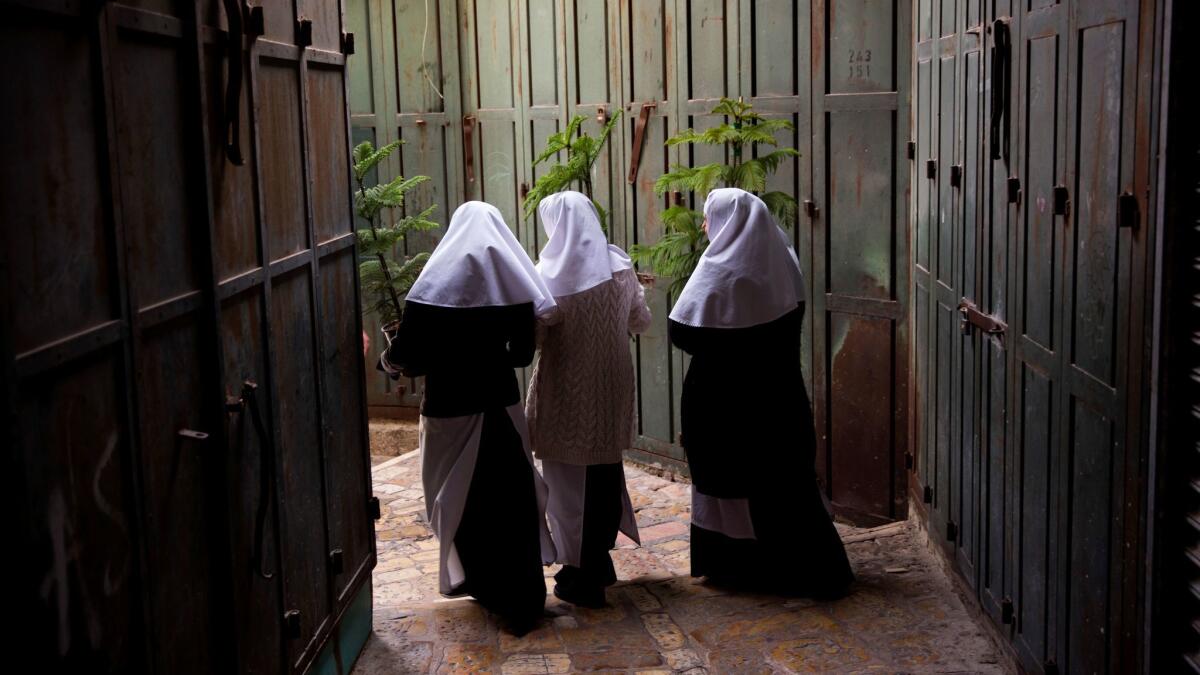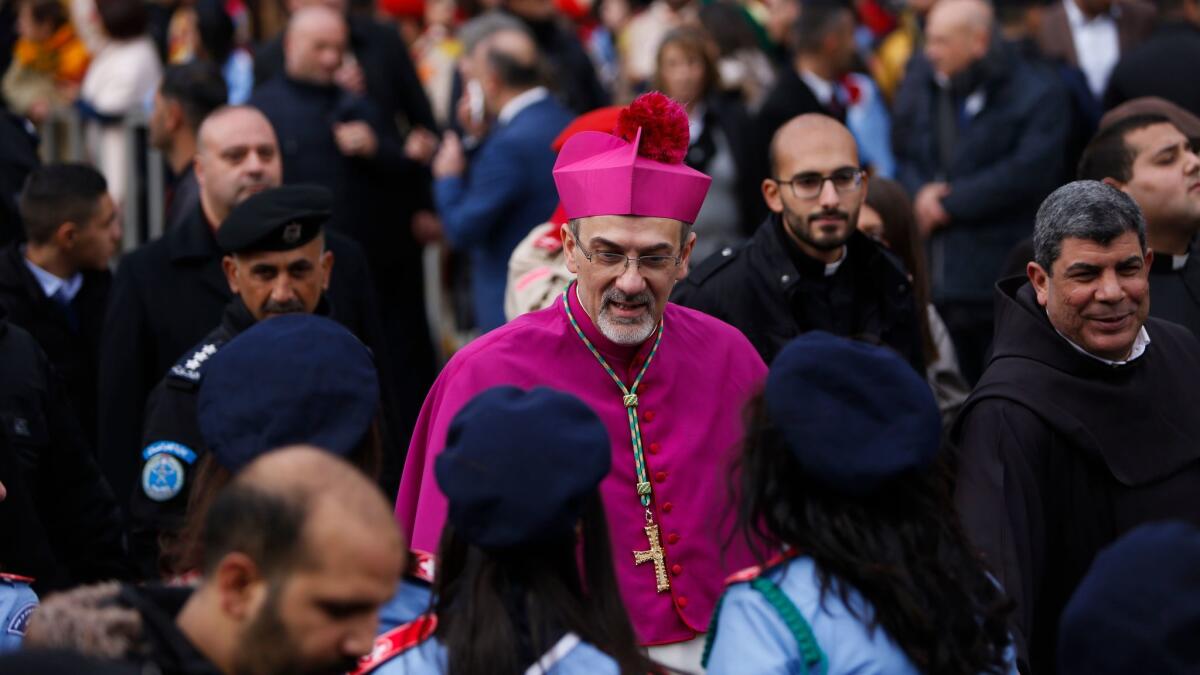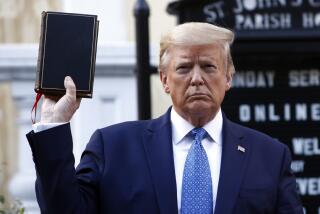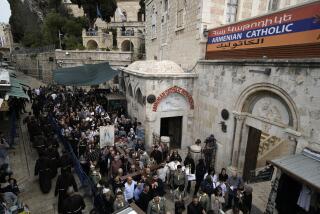There’s a sharp split among Christians over Trump’s decision to recognize Jerusalem as Israel’s capital

One recent night, Pastor Bruce Mills of the Jerusalem Baptist Church appeared before a group of clergy of various Christian denominations. They wanted him to explain why American evangelical Christians were so elated by President Trump’s decision to recognize Jerusalem as Israel’s capital.
“I was shocked,” he said, “because they had no idea.”
The divide between evangelicals and other Christian denominations reflects two views of Jerusalem — one traditional and political, the other literal and theological. The key to understanding this rift is the evangelical belief in what is necessary to pave the way for the second coming of Jesus.
For many Holy Land Christians, Trump’s declaration was about as welcome as a biblical curse.
For American evangelical Christians, it has largely been welcomed as an auspicious sign from on high.
Hours before the declaration on Dec. 6, Jerusalem’s Orthodox Christian patriarchs and heads of local churches sent Trump a letter predicting that “such steps will yield increased hatred, conflict, violence and suffering in Jerusalem and the Holy Land, moving us farther from the goal of unity and deeper toward destructive division.”

And yet, across the ocean, Tony Perkins, president of the conservative Christian Family Research Council, said on a White House visit that “evangelical conservatives are grateful” to Trump for his decision on Jerusalem.
“My sense is that American evangelicals are viewing this in purely theological terms,” said Rev. Paul Brandeis Raushenbush, senior vice president of Auburn Seminary, a 200-year-old New York institution that is active in the multi-faith movement for social justice, “whereas Christians who live in the region are viewing this in more political and social terms.”
“If you view the world in terms of a grand cosmological drama, of which this is a plot point that seems favorable to the return of Christ, this is a wonderful thing, and it makes it easier to disregard whatever implications it may have for Christians on the ground in the region,” Raushenbush said.
Mills, the Baptist pastor, is a native of Los Angeles and acolyte of the Rev. Billy Graham. He has been based in Jerusalem since 1971 and was invited to address his colleagues at the Ecumenical Circle of Friends on Thursday.
“It’s very simple,” he said. “The formation of the state of Israel was not because of Jews. The formation of the state of Israel was because of evangelicals.… The whole idea is Jews coming back to Israel!”
For anyone outside the fold of evangelical Christianity, this idea may not appear as intuitive.
The excitement of Trump’s evangelical voters stems from their belief that the Jewish return to Israel is part of a larger plan involving the second coming of Christ and the Jews’ acceptance of Jesus as the messiah, a notion difficult to square with the Israeli government’s conviction that Trump’s policy shift strengthens Israel’s hold on Jerusalem as the “eternal and united capital of the Jewish people.”
Israeli Prime Minister Benjamin Netanyahu has repeatedly thanked Trump for his declaration, on Friday saying that he believed “many other countries will do the same.” The day before, the United Nations had voted overwhelmingly to denounce the declaration, with just nine countries, including Israel and the United States, voting no.
“My sense is that for the Jews who are grateful for this support, of course they don’t buy any of this stuff about Jesus coming back,” Raushenbush says. “They’re not really interested in that quest; they’re interested in who is going to give them the political heft they desire. I’m pretty sure that on both sides, once you go into theology, they have vastly different theologies and beliefs.”
But the division between Christians and Jews is no less dramatic than the discord among Christian denominations.
When Vice President Mike Pence announced that he would be visiting Israel — a visit that was later postponed — many members of the local Christian clergy said they would refuse to meet with him. On the Wednesday before Christmas, at an annual gathering with journalists, Father Pierbattista Pizzaballa, one of the most senior Catholic officials in the Holy Land, called the visit “a problem.”

Pence is one of the Trump administration officials most closely identified with the evangelical movement. His Mideast tour was originally conceived by the White House as a visit of solidarity with beleaguered Christian communities in the Middle East.
Pizzaballa, the apostolic administrator of the Latin Patriarchate of Jerusalem (which covers all Catholic dioceses in Israel, the Palestinian Authority, Jordan, Syria, Lebanon, Cyprus, Egypt and Rhodes) said of Pence that “even the biggest sinner in the world cannot be told not to come to church if he wants to pray.” But neither, he said, can Christians ignore the political consequences.
“The local Christians here are Palestinians,” Pizzaballa added. “Their vision about Jerusalem is as Palestinians. As Christians, of course, we also have something that goes beyond a political vision, universality and religious symbolism,” but the views held by his worshippers and American Christians, are, he said, on the whole “two completely different approaches.”
According to Mills, evangelical Christians constitute less than one-tenth of 1% of the population of Israel. The Israeli government does not keep statistics on affiliation with specific Christian denominations, but the vast majority of Israeli Christians, about 700,000, or 2% of the country’s population, belong to what Mills calls “the historic churches,” the Orthodox and Catholic denominations that trace their roots to the time of Jesus.
Charles Kopp, an American pastor who has lived in Israel for 51 years and presides over the Narkis Street Congregation, an evangelical church that is considered more liberal than Mills’, believes the reality of Middle Eastern Christians, who mostly live in Muslim-majority communities, explains the breach.
“The Christians here are very dear people and faithful, and have stood through the test of fire all these years and still have faith in the communion,” he said. “But under a dominion of a power that is not exactly amenable to them, they know their place.”
Tarnopolsky is a special correspondent.
More to Read
Start your day right
Sign up for Essential California for news, features and recommendations from the L.A. Times and beyond in your inbox six days a week.
You may occasionally receive promotional content from the Los Angeles Times.






